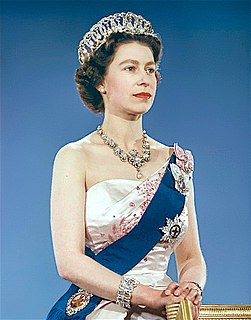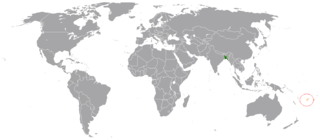 |
|---|
The members of the Parliament of Fiji from 1972 until 1977 consisted of members of the House of Representatives elected between 15 and 29 April 1972, and members of the nominated Senate.
 |
|---|
The members of the Parliament of Fiji from 1972 until 1977 consisted of members of the House of Representatives elected between 15 and 29 April 1972, and members of the nominated Senate.
| Class | Member | Notes | |
|---|---|---|---|
| President | Robert Munro | ||
| Great Council of Chiefs' Nominees | Napolioni Dawai | ||
| Jone Mataitini | Replaced by Glanville Lalabalavu in October 1976 | ||
| Apakuki Nanovo | |||
| Meli Salabogi | Replaced by Jone Kikau in 1973 | ||
| Inoke Tabua | |||
| Kavaia Tagivetaua | |||
| Livai Volavola | |||
| Tiale Vuiyasawa | Replaced by Josaia Tavaiqia in 1973 | ||
| Council of Rotuma's Nominee | Wilson Inia | ||
| Leader of the Opposition's Nominees | Glanville Lalabalavu | Replaced by Asela Logavatu in 1973 | |
| Eqbal Mohammed | Replaced by Bakshi Balwant Singh Mal in 1976 | ||
| Jai Ram Reddy | Replaced by Ratilal Patel in 1977 | ||
| Kaur Baltan Singh | |||
| Sarvan Singh | Replaced by Shiromaniam Madhavan in 1974 | ||
| Mosese Tuisawau | Replaced by Chandra Prakash Bidesi in 1976 | ||
| Prime Minister's Nominees | Felix Emberson | Replaced by Tomasi Vakatora in 1976 | |
| John Falvey | |||
| Penaia Ganilau | Replaced by Vivekanand Sharma in 1973 | ||
| Ramanlal Kapadia | |||
| Anaseini Qionibaravi | Replaced by Joeli Nacola in 1976 | ||
| Eddie Wong | Replaced by Charles Walker | ||
| Source: USP, USP, USP, USP | |||

Fiji has experienced many coups recently, in 1987, 2000, and 2006. Fiji has been suspended various times from the Commonwealth of Nations, a grouping of mostly former British colonies. It was readmitted to the Commonwealth in December 2001, following the parliamentary election held to restore democracy in September that year, and has been suspended again because of the 2006 coup, but has been readmitted a second time after the 2014 election. Other Pacific Island governments have generally been sympathetic to Fiji's internal political problems and have declined to take public positions.

Fiji, officially the Republic of Fiji, is an island country in Melanesia, part of Oceania in the South Pacific Ocean. It lies about 1,100 nautical miles northeast of New Zealand. Fiji consists of an archipelago of more than 330 islands—of which about 110 are permanently inhabited—and more than 500 islets, amounting to a total land area of about 18,300 square kilometres (7,100 sq mi). The most outlying island group is Ono-i-Lau. About 87% of the total population of 883,483 live on the two major islands, Viti Levu and Vanua Levu. About three-quarters of Fijians live on Viti Levu's coasts: either in the capital city of Suva; or in smaller urban centres such as Nadi—where tourism is the major local industry; or in Lautoka, where the sugar-cane industry is dominant. The interior of Viti Levu is sparsely inhabited because of its terrain.

The Senate of Fiji was the upper chamber of Parliament. It was abolished by the 2013 Constitution of Fiji, after a series of military coups. It was the less powerful of the two chambers; it could not initiate legislation, but could amend or veto it. The Senate's powers over financial bills were more restricted: it could veto them in their entirety, but could not amend them. The House of Representatives could override a Senatorial veto by passing the bill a second time in the parliamentary session immediately following the one in which it was rejected by the Senate, after a minimum period of six months. Amendments to the Constitution were excepted: the veto of the Senate was absolute. Following the passage of a bill by the House of Representatives, the Senate had 21 days to approve, amend, or reject it; if at the expiry of that period the Senate had done nothing about it, it was deemed to have passed the bill.

The House of Representatives was the lower chamber of Fiji's Parliament from 1970 to 2006. It was the more powerful of the two chambers; it alone had the power to initiate legislation. The House of Representatives also had much greater jurisdiction over financial bills; the Senate could not amend them, although it might veto them. Except in the case of amendments to the Constitution, over which a veto of the Senate was absolute, the House of Representatives might override a Senatorial veto by passing the same bill a second time, in the parliamentary session immediately following the one in which it was rejected by the Senate, after a minimum period of six months.

Ratu Sir George Kadavulevu Cakobau was Governor-General of Fiji from 1973 to 1983. A great-grandson of Ratu Seru Epenisa Cakobau, the King of Bau who had unified all the tribes of Fiji under his reign in the mid-1800s and subsequently ceded the islands to the United Kingdom in 1874, Ratu Sir George held the traditional titles of Vunivalu of Bau and Tui Levuka and thus was considered by many as Fiji's highest-ranking traditional chief. Ratu Cakobau was appointed Governor-General in 1973, becoming the first indigenous Fijian to serve as the representative of Queen Elizabeth II.

Fiji has held 12 general elections, 10 for the House of Representatives since becoming independent of the United Kingdom in 1970; there had been numerous elections under colonial rule, but only one with universal suffrage and 2 for the Parliament of Fiji since the establishment of the 2013 constitution. In this period, Fiji has had four constitutions, and the voting system has changed accordingly.

General elections were held in Fiji between 15 and 29 April 1972, the first since independence from the United Kingdom in 1970. They were characterised by the lack of rancour between racial groups, typical of the 1966 general election and the 1968 by-elections.

The Parliament of the Republic of Fiji is the unicameral legislature of the Republic of Fiji. It consists of 51 members elected every 4 years using open list proportional representation in one multi-member nationwide constituency.

The Legislative Council of Fiji was the colonial precursor to the present-day Parliament, which came into existence when Fiji became independent on 10 October 1970.

The Colony of Fiji was a British Crown colony that existed from 1874 to 1970 in the territory of the present-day nation of Fiji. London declined its first opportunity to annex the Kingdom of Fiji in 1852. Ratu Seru Epenisa Cakobau had offered to cede the islands, subject to being allowed to retain his Tui Viti title. His demand was unacceptable to both the British and to many of his fellow chiefs, who regarded him only as first among equals, if that. Mounting debts and threats from the United States Navy had led Cakobau to establish a constitutional monarchy with a government dominated by European settlers in 1871, following an agreement with the Australian Polynesia Company to pay his debts. The collapse of the new regime drove him to make another offer of cession in 1872, which the British accepted. On 10 October 1874, Britain began its rule of Fiji, which lasted until 10 October 1970.

General elections were held in Fiji between 26 September and 8 October 1966, the last before independence in 1970 and the first held under universal suffrage. The result was a victory for the Alliance Party, which won 23 of the 34 elected seats. Its leader Kamisese Mara became the country's first Chief Minister the following year.

National constituencies were a former feature of the Fijian electoral system. They were created as a compromise between demands for universal suffrage on a common voters' roll, and for a strictly communal franchise, with Parliamentary constituencies allocated on an ethnic basis and elected only by voters enrolled as members of specific ethnic groups.

The Attorney-General is a political and legal officer in Fiji. The Attorney-General is the chief law officer of the State, and has responsibility for supervising Fijian law and advising the government on legal matters. Like other members of the Fijian Cabinet, the Attorney-General is appointed by the President on the advice of the Prime Minister.

The monarchy of Fiji arose in the nineteenth century, when native ruler Seru Epenisa Cakobau consolidated control of the Fijian Islands and declared himself King or paramount chief of Fiji. In 1874, he voluntarily ceded sovereignty of the islands to Britain, which made Fiji a Crown colony within the British Empire.
Ayodhya Prasad Sharma was an Indo-Fijian farmers' leader and politician. He formed the most successful farmers' union in Fiji and forced the Colonial Sugar Refining Company to make concessions to farmers after 60 years of total control over Fiji's economy. However, other Indo-Fijian leaders formed rival unions and his initial success was not repeated. He also served as a member of the Legislative Council between 1953 and 1959.
Unlike the majority of Fiji's Indian population, who are descendants of Indian indentured labourers brought to Fiji between 1879 and 1916, most of the Sikhs came to Fiji as free immigrants. Most Sikhs established themselves as farmers. Sikhs also came to Fiji as policemen, teachers and preachers. In recent years large numbers of Sikhs have emigrated from Fiji, especially to the United States, Canada, the United Kingdom, Australia and New Zealand. Sikhs in Fiji are generally referred to as Punjabis.
The 1972 Australia rugby union tour of New Zealand and Fiji was a series of thirteen rugby union matches, including three tests, played by the Wallabies in New Zealand, plus a one-off test match played by the Wallabies against the Fijians in Fiji. The tour took place in August and September 1972.

Bangladesh–Fiji relations refer to the bilateral relations between Bangladesh and Fiji. Fiji recognized Bangladesh on January 31, 1972. Diplomatic relations between the two countries were officially started in 2003. The two countries are common members of the Commonwealth of Nations. In 2013, the Foreign Minister of Bangladesh urged the Fijian government to steer the country towards democracy.

Severe Tropical Cyclone Bebe, also known as Hurricane Bebe, was a pre-season storm during October 1972 in the South Pacific Ocean that severely affected Fiji, the Ellice Islands, and the Gilbert Islands.